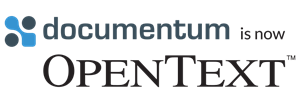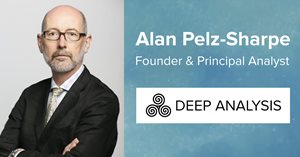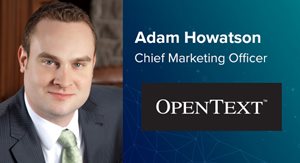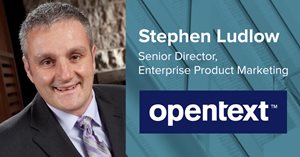"OTX Will Invest in Documentum the Latter More Than the Former”
Last year, OpenText, a Canadian enterprise information management vendor, acquired Dell  Technologies' Enterprise Content Division (ECD), including Documentum for $1.62 billion in a deal. Since the acquisition was disclosed, the deal has become one of the most controversial topics in the Enterprise Content Management space because there is a complementary technology as well as overlapping functionalities between ECM’s Enterprise Content Division (ECD) including Documentum and OpenText’s Content Server.
Technologies' Enterprise Content Division (ECD), including Documentum for $1.62 billion in a deal. Since the acquisition was disclosed, the deal has become one of the most controversial topics in the Enterprise Content Management space because there is a complementary technology as well as overlapping functionalities between ECM’s Enterprise Content Division (ECD) including Documentum and OpenText’s Content Server.
Although OpenText has been working hard on banishing the doubts coming from a somewhat distrusting
#paid
user base, there has still been some concerns that OpenText will milk the cash cow, aka Documentum, and the product won’t see any substantial innovation. In fact, some ECM specialists suggest their clients move off of Documentum. I have started wondering if there was a strategic purpose behind this recommendation, including generating additional services revenue for the ECM specialists considering re-platforming is a big project that requires spending big bucks. To put my questions to rest and go more in-depth on the aftermath of the acquisition, I reached out to Alan Pelz-Sharpe, founder and principal analyst at Deep Analysis.
Regarding the conspiracy theory aforementioned about a strategic purpose, he commented:  “Well every competitor will use the acquisition of a company to suggest folks should move - but at this point, I don’t see any reason that there is a compelling argument to support it. For sure OpenText will milk cash cow elements of the Documentum business and they should. But Documentum brought more than a rival ECM system. It brought a lot of expertise and blue chip clients in regulated industries. Documentum, although it had been cash-strapped by EMC, was developing some strong cloud and application development technologies. Long story short, there are elements of Documentum that are ‘legacy’ and essentially cash cows, there are other elements that can be strong growth products. OpenText will invest in the latter more than the former.”
“Well every competitor will use the acquisition of a company to suggest folks should move - but at this point, I don’t see any reason that there is a compelling argument to support it. For sure OpenText will milk cash cow elements of the Documentum business and they should. But Documentum brought more than a rival ECM system. It brought a lot of expertise and blue chip clients in regulated industries. Documentum, although it had been cash-strapped by EMC, was developing some strong cloud and application development technologies. Long story short, there are elements of Documentum that are ‘legacy’ and essentially cash cows, there are other elements that can be strong growth products. OpenText will invest in the latter more than the former.”
When we asked OpenText CMO Adam Howatson what exactly this acquisition will bring to OpenText, he brought up very similar points with Pelz-Sharpe and said: “ECD brought us a  number of different things, not least of which are a geographical coverage, a deep vertical industry expertise, the ECM market leadership, the Leap platform, and a pure SaaS destination platform with a micro-services based architecture that allows for applications to be built upon or have the platform extended providing additional capabilities in the form of applications for an additional microservice.” On this point, it is worth noting that with the acquisition, ECD provided OpenText an expanded coverage geographically into markets such as the Middle East, Africa, China, South Korea, Eastern Europe, and Russia, where OpenText may have had some small market share.
number of different things, not least of which are a geographical coverage, a deep vertical industry expertise, the ECM market leadership, the Leap platform, and a pure SaaS destination platform with a micro-services based architecture that allows for applications to be built upon or have the platform extended providing additional capabilities in the form of applications for an additional microservice.” On this point, it is worth noting that with the acquisition, ECD provided OpenText an expanded coverage geographically into markets such as the Middle East, Africa, China, South Korea, Eastern Europe, and Russia, where OpenText may have had some small market share.
He also added that the company will “continue to deliver active investment and active innovation across the entire ECD portfolio, full stop.”
Since the OpenText execs are very confident that they will combine OpenText’s product expertise with Documentum’s vertical industry expertise and bring the integration back into the Documentum portfolio, I wanted to ask Pelz-Sharpe if there is any significant investment he thinks OpenText has made in Documentum since the deal closed. He said: “It’s worth remembering that the deal only closed this year so the bigger announcements won’t come until later this year at best. But I understand that OpenText is investing in bringing Documentum into its broad AI strategy and OpenText is also now doing a lot in business applications (note the recent HR release ) so the LEAP technology they got as part of the deal is key here to their future investments and growth strategy. As are the applications and deep expertise that Documentum had for regulated industries from finance to engineering.”
When it comes to deep vertical industry expertise that Pelz-Sharpe pointed out, ECD’s expertise, particularly around pharmaceutical and life science as well as the U.S public sector, will help OpenText penetrate into those verticals. OpenText is also adding the analytical and discovery capabilities into Documentum, and by virtue of many more upcoming integrations, while the ECD platform once was a preeminently content management centric portfolio, now it is expected to complete the whole EIM story for Documentum customers. Howatson claims that the acquisition stands a huge opportunity for both Documentum customers and OpenText content services customers as OpenText provides Documentum customers an integration with a broader EIM platform while bringing very important capabilities like InfoArchive to the OpenText portfolio.
On top of these all, as evidence, OpenText already highlighted the values of having Documentum in its Life Sciences Solutions Suite that can immediately benefit both OpenText and Documentum Life. Given the Life Sciences industry is considered Documentum’s strength and OpenText leveraged it just after the acquisition, it doesn’t sound to me that the vendor is milking the acquisition for maintenance revenue.
Additionally, during a webcast, Stephen Ludlow, Senior Director, Enterprise Product Marketing  at OpenText, made it clear that current roadmaps and commitments remain stable and will be delivered. Here are some focus areas of Documentum investment:
at OpenText, made it clear that current roadmaps and commitments remain stable and will be delivered. Here are some focus areas of Documentum investment:
-
Industry Solution – specifically Life Sciences, Energy, and Engineering
-
Continued Enhancement – Documentum and applications like D2 and InfoArchive to improve usability, analytics and total cost of ownership
-
OpenText Cloud – Managed Services offerings in the OpenText Cloud.
While Gartner’s analysts noted: “OpenText has invested heavily in embedding CSP capabilities within common line-of-business and productivity applications, creating a contextualized user experience,” the Stamford, Conn.- based research firm also cited in its report: “The vendor's CSP portfolio consists of many disparate products, some of which have considerable overlap and could confuse prospects about an optimal solution path.” For our coverage of Gartner's MQ for Content Services Platforms (CSP), I reached out to Stephen Ludlow and asked if there are any future plans or ongoing projects to address this growth opportunity. Here’s what Ludlow said:
“Yes, OpenText has plans to address both the opportunity and the broad portfolio that Gartner has cited. OpenText will continue to invest in embedding CSP capabilities into more common line-of-business applications – both with the traditional on-premises platforms, as well as with our cloud-based CSP. This dual investment ensures that existing customers will continue to see innovation as well as providing a clear path for when organizations want to shift their consumption of content services to cloud.”
How About the Board Shakeup at EMC ECD after the Acquisition?
In other news, Fred Monjazeb, former senior vice president of sales and operations for EMC’s  ECM, has lately joined Nuxeo as their new CRO. I thought it was an interesting detail that ties up to this story and made me wonder if it has an impact on the speculations saying that OpenText bought ECD for the maintenance business because the departure of Fred Monjazeb has marked the fourth top executive resignation in EMC ECD after former CTO Jeroen van Rotterdam left to join Citrix as SVP of Technology, former President Rohit Ghai left to join Dell Technologies’ RSA subsidiary, and Christopher McLaughlin the former CMO of EMC ECD left to become a new CMO of Nuxeo.
ECM, has lately joined Nuxeo as their new CRO. I thought it was an interesting detail that ties up to this story and made me wonder if it has an impact on the speculations saying that OpenText bought ECD for the maintenance business because the departure of Fred Monjazeb has marked the fourth top executive resignation in EMC ECD after former CTO Jeroen van Rotterdam left to join Citrix as SVP of Technology, former President Rohit Ghai left to join Dell Technologies’ RSA subsidiary, and Christopher McLaughlin the former CMO of EMC ECD left to become a new CMO of Nuxeo.
It makes sense for them to leave before it is too late, as OpenText will not need two people in each role. However, this board shakeup didn’t help OpenText clear the air for the Documentum customers, instead, it has injected more uncertainty into the situation. I picked Pelz-Sharpe’s brain on the meaning of the board shakeup. He noted that he doesn’t read much in to senior leadership departures after an acquisition as it is to be expected and he elaborated on his point, saying: “If we take Chris McLaughlin, for example, he is now in charge of running all the Marketing for another ECM vendor - rather than just one of a team of marketers at a $2B firm. It is normal attrition.” He believes that more worrying is if scores of folk leave from the core engineering and R&D teams but he doesn’t believe that has happened.
Having more of a positive/neutral view on the situation than some of his peers, Alan Pelz-Sharpe summed it all up by saying: “Big acquisitions take a long time to digest. OpenText paid well over $1B for Documentum, and I don’t believe they did that just to milk a cash cow.”
My POV
Since OpenText does not have a history of substantial investments when it comes to the acquired companies, I can understand where the concerned Documentum customers are coming from. Having said that, it is worth reminding that before this acquisition, Documentum had been giving up its industry-leading position under the shadow of EMC in recent years. EMC is a strong hardware company, whereas OpenText is a software company that offers a platform armed with a rich enterprise information management around its content management system. Being also a software firm, ECD’s products such as Documentum, InfoArchive, and LEAP made this acquisition more of a natural fit than the deal with EMC.
When we look over the horizon, I agree with Alan Pelz-Sharpe on his point saying: “Big acquisitions take a long time to digest.” In my opinion, it would be a premature decision to move off of Documentum for now.

Venus Tamturk
Venus is the Media Reporter for CMS-Connected, with one of her tasks to write thorough articles by creating the most up-to-date and engaging content using B2B digital marketing. She enjoys increasing brand equity and conversion through the strategic use of social media channels and integrated media marketing plans.